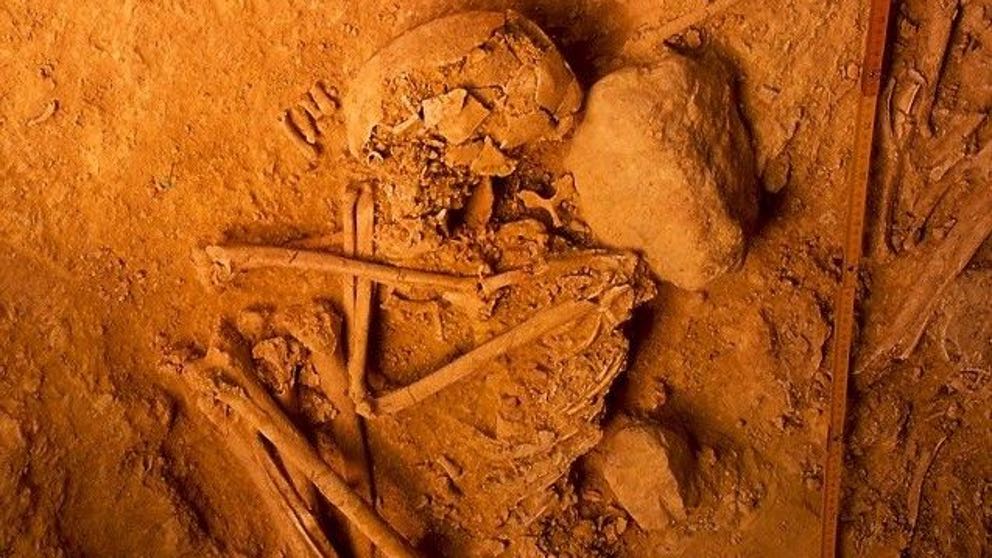This article was translated by John R. Bopp
This is what was insinuated by the authors of a study published on Thursday in PLOS Genetics and picked up by the website Science Daily. In it, they explain how the invasions 5,000 years ago by the nomadic Indo-Europeans who arrived from Eurasia during the Bronze Age barely left behind any genetic fingerprint in the Iberian Peninsula.
The explanation given for this “lack of genetic fingerprint” is that these peoples with culture, customs, traditions, and languages that were different from those of the “local” Europeans never managed to settle in the Iberian Peninsula.
The discordance between these data and the ones that we already know about the diffusion of bronze metallurgy that took place in Iberia when it was introduced by these nomadic peoples is striking. In the south of the peninsula, there are important remains that indicate this technology was widespread, which seems to show that there was an important presence of these nomadic peoples right from the start of the Bronze Age.
According to their explanation, this may explain the survival of pre-Indo-European languages like Basque in Iberia. They weren’t substituted by the newer arrivals, which is something that did happen in the rest of Europe. We couldn’t help but remember the study that was presented with great fanfare which claimed, at least according to statements in the media, that the Basques had received an important part of their genetics from these new arrivals, and that they didn’t descend from the original Europeans. These results were received with great media fanfare, because it “proved” that the Basques were not as old as those deceitful Nationalists would have everyone believe. At that time, we wrote a lengthy and rather controversial article, which you can find here.
It’s a shame that this work only focuses on the Iberian Peninsula. If they had also included Aquitaine, perhaps they could have explained to us how Basque ended up being a habitual language in that area for many centuries after the Indo-European migrations. Is it that the Indo-European peoples didn’t settle there, either?
By the way, the explanation for the survival of this language has many answers that work together to help us understand how it happened. But the main reason, the core of this survival, is the love of this people for its language, and their determination to preserve it.
We’re adding this study to our genetics section. It’s just more data to help explain the origin of the Basques. But for now, in addition to the studies that explain the presence of the Basque genetic fingerprint throughout half of Europe, and the continuation of the settlements in the Basque Country over ten millennia, what is most convincing for explaining the origin of the Basques is the story told by Basque priest Pierre d’Iharce de Bidassouet:
“Do know that we the Rohans date from the 12th century” said a noble Frenchman. To which the Basque villager responded, “Well, we, the Basques, don’t date.”
That.
We’ll leave you with the article on Science Daily, and a report that’s already been published in La Vanguardia.
Science Daily 27/7/2017 – USA
Bronze Age Iberia received fewer Steppe invaders than the rest of Europe
The genomes of individuals who lived on the Iberian Peninsula in the Bronze Age had minor genetic input from Steppe invaders, suggesting that these migrations played a smaller role in the genetic makeup and culture of Iberian people, compared to other parts of Europe. Daniel Bradley and Rui Martiniano of Trinity College Dublin, in Ireland, and Ana Maria Silva of University of Coimbra, Portugal, report these findings July 27, 2017 in PLOS Genetics.
(Continue) (Google translator)
La Vanguardia – 27/7/2017 – España
El ADN antiguo explica por qué el euskera sobrevivió en la península ibérica
Todos los idiomas que se hablan hoy en día en Europa tienen el mismo origen: las lenguas indoeuropeas. Salvo por unas pocas excepciones. Una de ellas es el euskera, que ya se hablaba antes de que los idiomas indoeuropeos llegaran al continente. Su supervivencia hasta la actualidad ha intrigado desde hace tiempo a arqueólogos y lingüistas; ahora, un estudio internacional ha analizado restos fósiles de Portugal correspondientes al Neolítico y la Edad del Bronce, y ha encontrado una explicación.
(Continue) (Automatic translation)
Last Updated on Dec 20, 2020 by About Basque Country





